Senior Lieutenant of the Artsakh Defense Army, Arsen Hakobyan, was already in positions before the “number 1” order of September 18, 2023. His wife, Mariam Hakobyan, who was 9 months pregnant with their daughter, was waiting for him at home.
Mariam and Arsen got married in October 2022 and soon found out they were going to become parents. Arsen, Mariam and newborn Alvina spent one full day together on September 24, in a blockade, between war and forced displacement.
Senior Lieutenant Arsen Hakobyan and Mariam’s brother, contract soldier Zhorik Hayrapetyan, were killed in the tragic explosion of October 25, 2023.
Half a loaf of bread
Even the days of the blockade, when the shops were almost empty and they were forced to stand in long lines to buy bread, left warm memories for Mariam. “Arsen would push half a loaf of bread to me, and I would push it back to him,” Mariam says smiling gently.
Arsen’s parents helped solve the food problem by sending them dairy products from the village. Mariam also remembers that all her relatives would give her whatever delicious food they had left, even the last remaining Snickers bar. “They would say: Take it to Mariam so that the child is born healthy. I got all their food.”
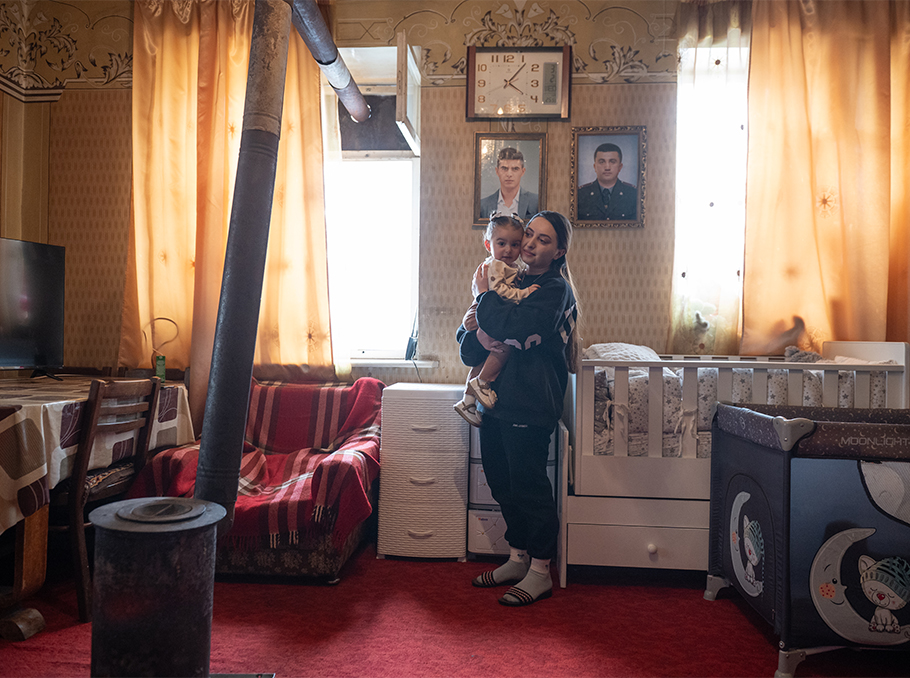
Photo: Davit Ghahramanyan
During those difficult days, pregnant women received help from Ruben Vardanyan, who provided an electric vehicle to take pregnant women to the hospital and back home, which became a real salvation in the conditions of widespread fuel shortages.
“Ruben Vardanyan is a good person, and my heart aches for him. I met him once, when he was handing out gifts to pregnant women. I remember that modest package as if it were yesterday: honey, doshab, fruit, and 2 small natural juices. I waited for my brother to get back and told him to drink the juice first. Later, when Arsen came home, we drank it together,” says Mariam.
The father rushing to the maternity hospital “in a stranger’s clothes”
On the evening of September 21, after two days of hiding in the basement from shelling, Mariam was taken to a maternity hospital in Stepanakert.
Mariam and Arsen’s daughter was born at 2:45am on September 22. Mariam, who had just given birth, noticed that her phone was next to her and sent a message to Arsen right away, sharing the joyful news. Arsen rushed into the maternity hospital and told their relatives who were waiting inside that the baby had been born. Everyone was surprised. They hadn’t been notified yet, how did Arsen know?
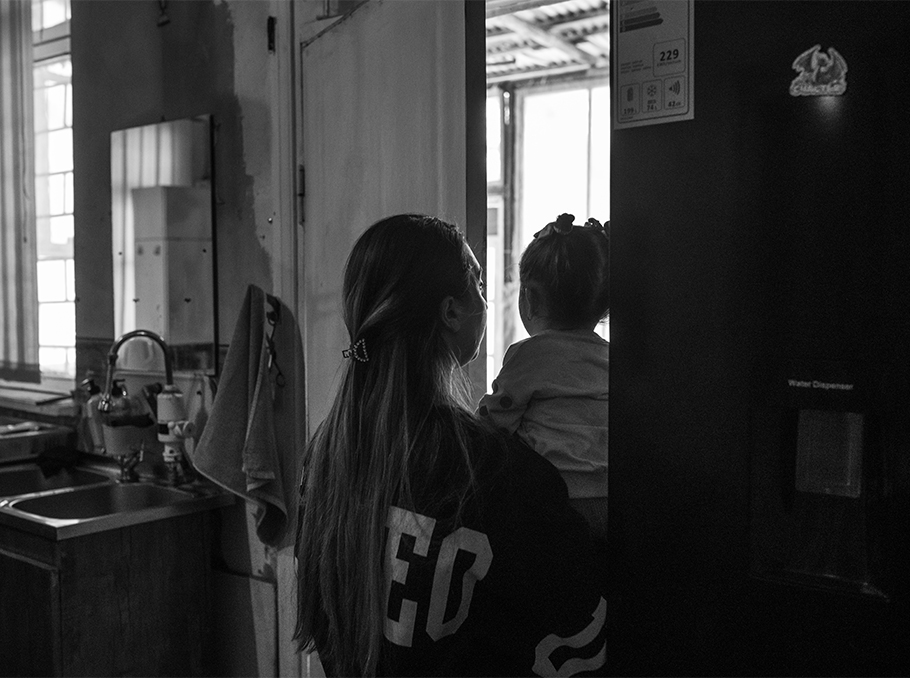
Photo: Davit Ghahramanyan
“When he came in I told him to get out, but he just wanted to hold the baby for a bit. Instead of his military uniform he was wearing some stranger’s clothes. It turned out that on his way to the hospital they were warned that the Azeris targeted those in uniforms. So, he asked some villagers for new clothes, burnt his own military uniform and everything related to the army and rushed to the hospital,” recalls Mariam
“I was so happy to see him. I told him to choose a name for the baby. We named her after his mother - Alvina.”
The next day they went home and managed to spend only one full day together.
The Bus of Hope
On September 25, they had already packed their things, put them in the car and were getting ready to leave. Although they had some gasoline, Arsen and Zhorik decided to go to a gas station for some fuel, just in case. “They thought they would have to make frequent stops for the baby, so there might not be enough gasoline,” says Mariam.
After the news of the tragic explosion broke out, they never heard from Arsen and Zhorik again. They could not be found anywhere. The family did not know what to do. They still hoped to hear some news, but at the same time they had to leave the city: the Azeris were already almost everywhere in Stepanakert.
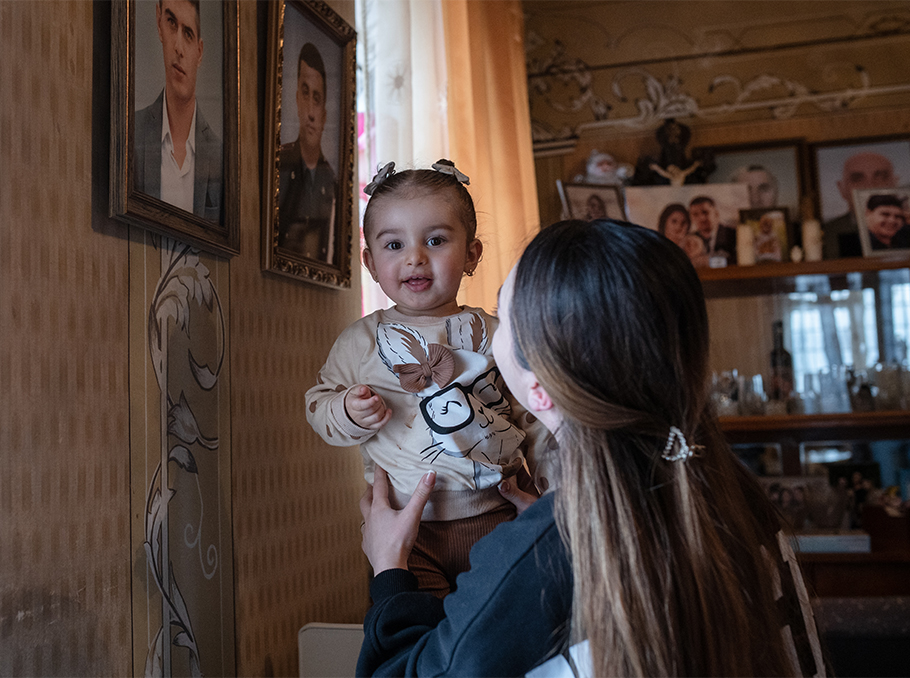
Photo: Davit Ghahramanyan
“The whole city was a mess, thousands of people were waiting in the square to be evacuated. We broke the door of our car, took some important things from it and went to the government building to ask for help. We had some bread, Alvinka’s clothes and a thermos of water for her milk,” Mariam remembers.
“We couldn’t get help at the government building, and were told that the Red Cross could transport Mariam and the baby by helicopter,” Mariam’s mother, Mrs. Marine, says.
“How could Mariam go alone with a 7-day-old baby, when she needed care herself, and we didn’t have any relatives there to meet us. We asked them to allow either me or Arsen’s mother to accompany Mariam, but were told it was impossible. So, we had to find another way out.”
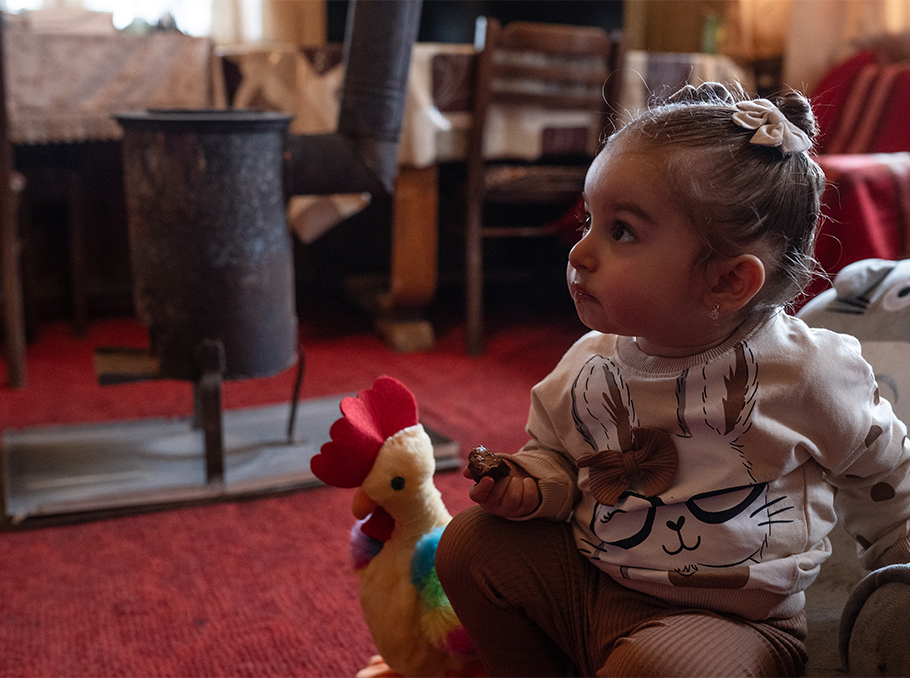
Photo: Davit Ghahramanyan
Mariam with baby Alvina in her arms, her and Arsen’s parents were waiting with dozens of other people gathered in the square. There were rumors that buses would soon arrive to evacuate people. People were very scared, wondering what would happen if the Turks got there first. They constantly called relatives, received calls from them, and tried to find someone with a car to drive them. One moment there was hope, the next moment there was despair.
Finally, Marine received a call from an acquaintance who was transporting people in a yellow bus. The driver asked them not to wait in the square, but to meet him at another location. “There are so many people in the square, I can’t take everyone, and I can’t say no to them either,” he explained.
Mariam’s mother ran quickly to the location the driver had mentioned so that they wouldn’t miss the bus, and the others followed her. They made it just on time.
“There were almost no empty seats left on the bus. Arsen’s mother and I sat at the front of the bus with our backs to the driver. Thus, we left our home, wondering where we were going, leaving our children behind,” recalls Mrs. Marine.
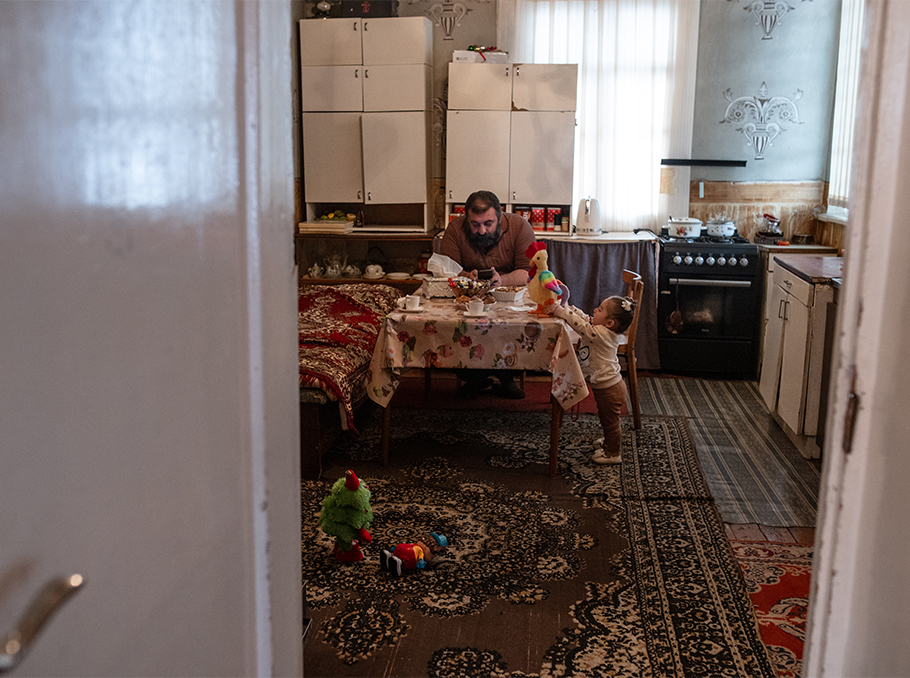
Photo: Davit Ghahramanyan
In just 6 hours the bus reached the border. The driver was very skillful and drove on the 3rd line, asking the others to keep the road open. “You will get there this way or another, whereas I have to go back to bring the others,” he would say.
Supportive people, familiar and unfamiliar
The Azerbaijanis got into the bus near the Hakar Bridge, handing out water bottles and filming their “generosity” on camera.
“We didn’t know where to look. After crossing the border, we threw away everything they gave us, and then our compatriots greeted us, filling the bus with all kinds of food. But we didn’t have the heart to eat,” says Mrs. Marine.
Once they reached Kornidzor, they saw buses heading to Stepanakert. “I called my neighbor, who was still waiting back in Stepanakert, and said: “The buses are on their way. I am calling to give you hope that they will save you,’” says Mrs. Marine:
Doctors, who met them in Goris, checked the baby, after which they continued their journey, and kept looking for a place to settle. They moved from one place to another, familiar and unfamiliar people reached out to them. On the other hand, they kept looking for the boys, but again, there was no news from them.
Finally, they managed to find a house in the village of Buzhakan to settle in. The conditions were not great, especially for a mother with a little baby, but they adapted, began to clean, furnish it and create some minimal living conditions.
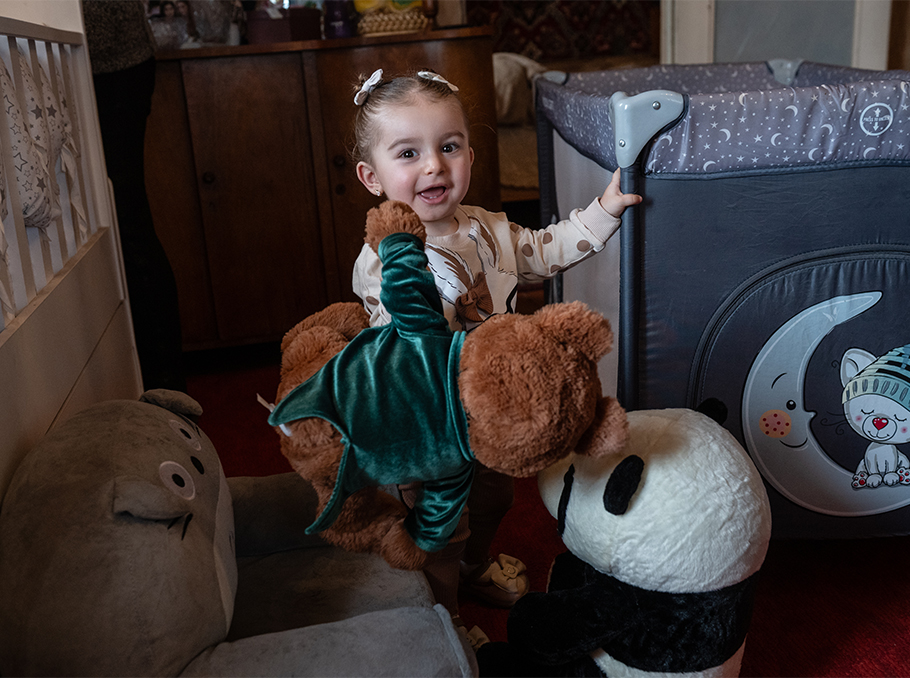
Photo: Davit Ghahramanyan
“We didn’t even go to the store during those days. Various people would call and offer help. The neighbors would come over, share what they had with us. People here are very caring. One neighbor would tell another: “I will give them milk, and you give them meat, so they don’t leave.” They didn't let us pay, even 100 drams. “I told them I wished it would all work out so I could pay them back,” Marine says emotionally, remembering the neighbors’ answers: “You don't owe us anything.”
The founder of Hayordi Foundation, Vache Vardanyan, visits the family to this day. Little Alvina is one of the beneficiaries of the Foundation’s “Mairenik” program, within the framework of which Mariam receives monthly support for the child’s needs.
Beyond physical borders
Marine did not want to take a DNA test, telling her husband that she was looking for her son and son-in-law among the living, and that the DNA test was for other cases. Eventually, she gave in at her husband’s insistence. About a month after the explosion, they received a call that the DNA test had been confirmed. On October 25, Arsen and Zhorik were buried at the Yeghvard cemetery.
“In the last few days, when Arsen refused to live the positions, I would say: “You love your homeland more than us,” and he would say that we were his homeland, so if he didn’t guard the border, how could he protect us?” Mariam says with tears in her eyes.
“Arsen especially loved Shushi, he used to say: “If war starts, we will liberate it.” He would always go and look at Shushi from above.”
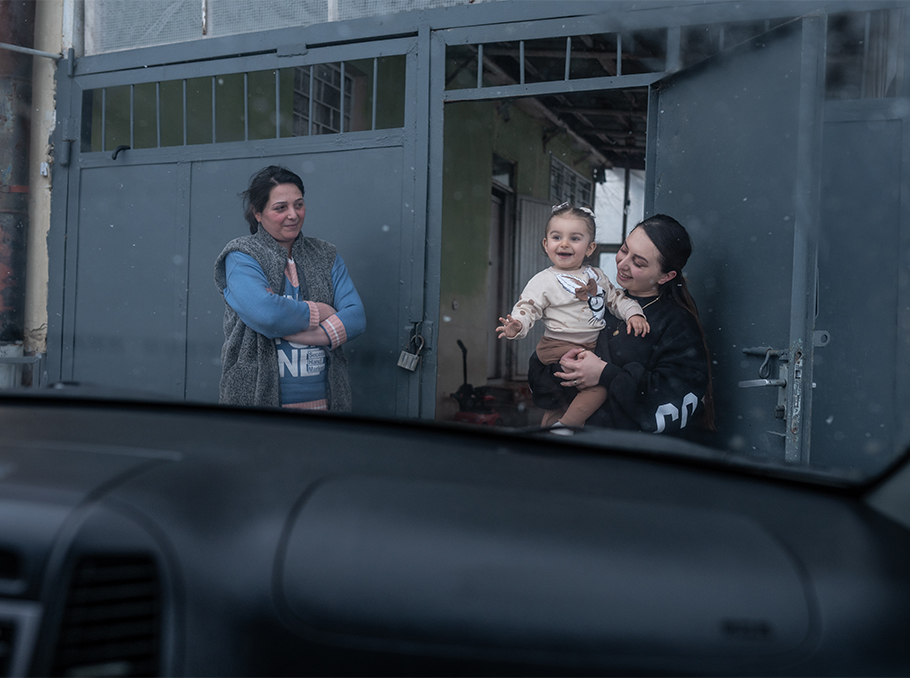
Photo: Davit Ghahramanyan
Mariam also vividly remembers the last bouquet of flowers her brother brought her, which he had found somewhere.
“After coming down from the positions, he hurried to see me. I opened the door and saw him standing there holding flowers. All the flower shops were empty because of the blockade. I asked him where he had found them, and he joked that he had picked them himself,” Mariam says with a teary smile.
Despite the intense pain of loss, the memories of loved ones continue to warm them. And every time her mother and grandmother cry with longing, little Alvina angrily comes up to them and makes them understand without words that they should not cry, but smile and be full of happiness. This is what our loved ones always want, even if they are not physically with us.
Gaiane Yenokian
Photos by David Ghahramanyan/ “Hayordi” Foundation
“Hayordi” Charitable Foundation’s “Mairenik” initiative is dedicated to supporting the children of those killed and missing as a result of the war and the explosion at a fuel depot in September 2023, who were born after their death. To help the Foundation’s programs, you can make a donation to the following account: 11815042199803 | Hayordi Charitable Foundation | ID Bank
Read also:
“Mairenik”: Resilient mothers and the caring community
A police officer’s honor, a woman’s promise, and a life-giving faith









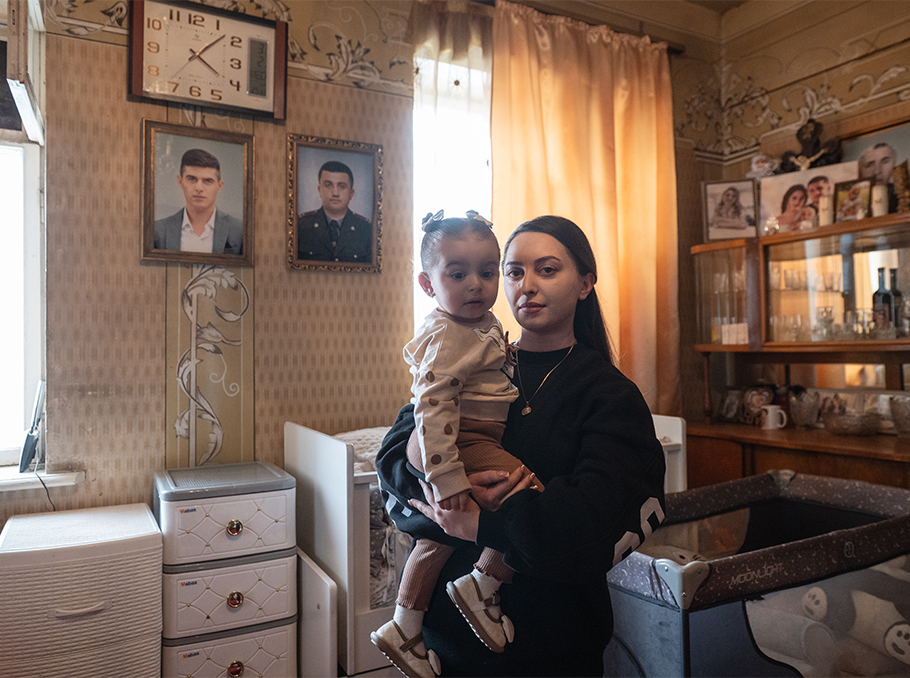
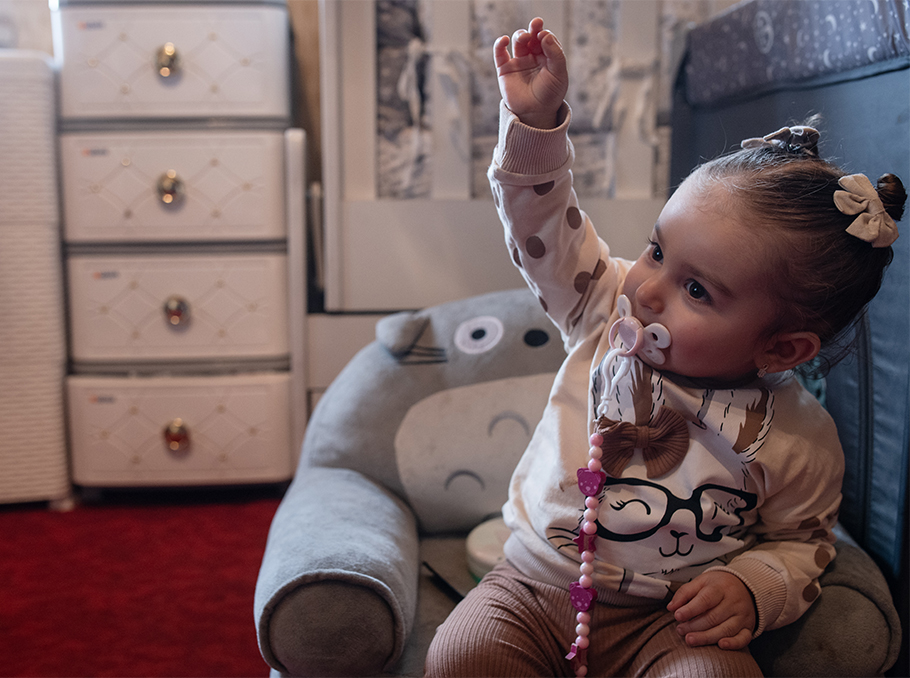
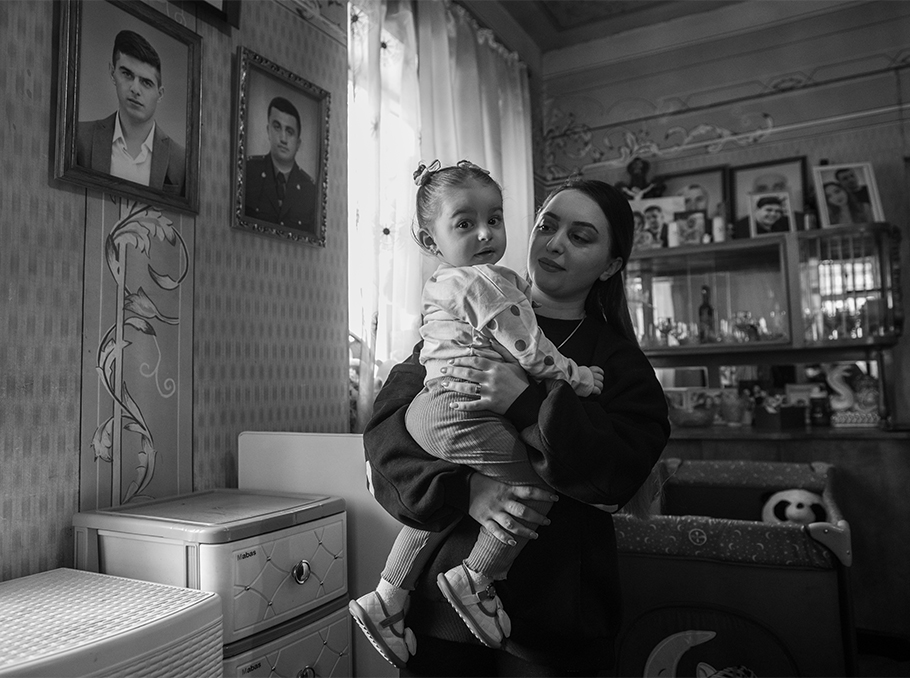
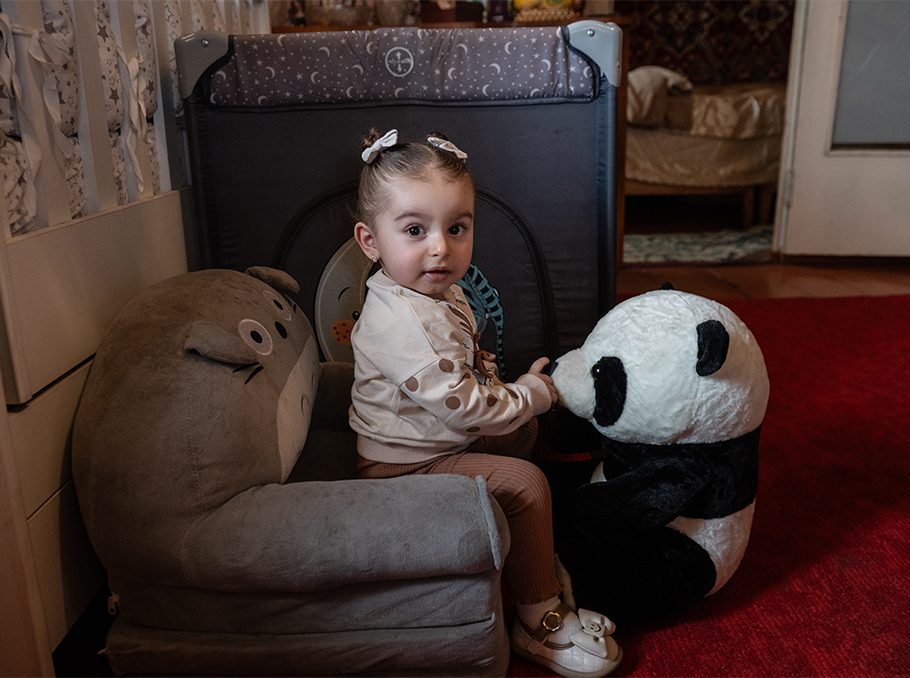
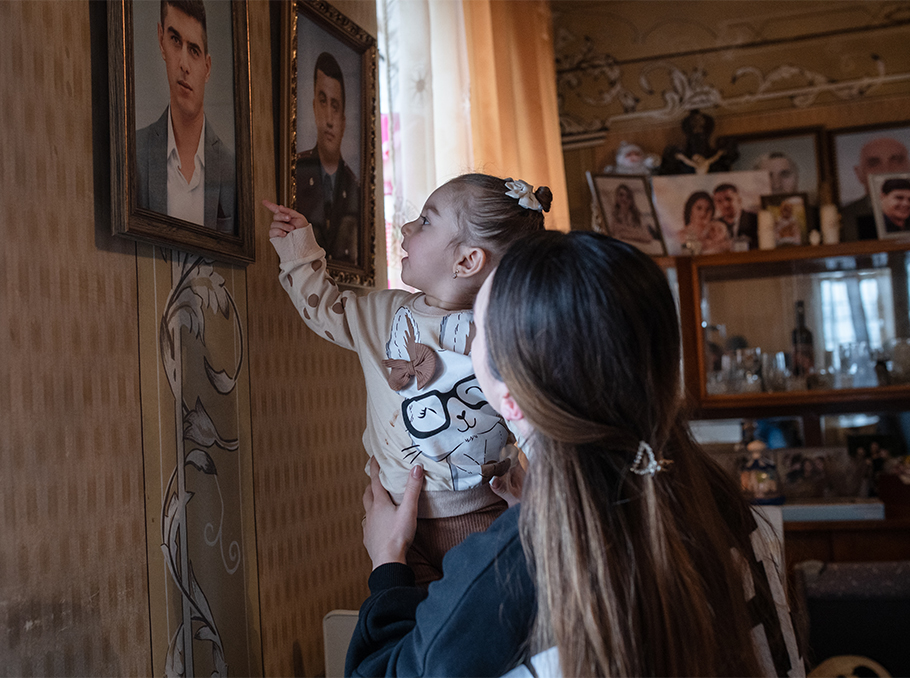

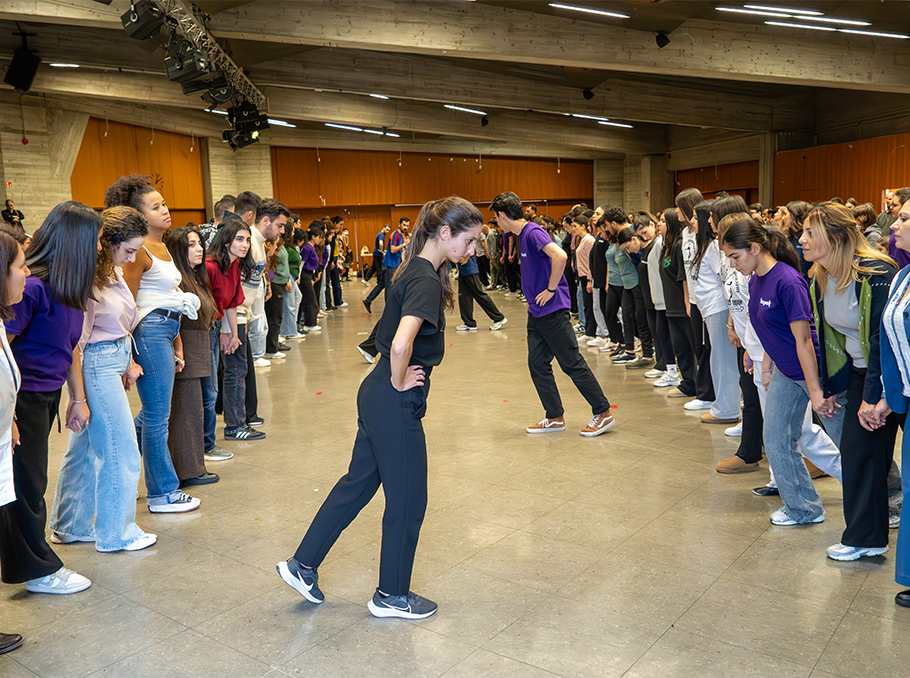
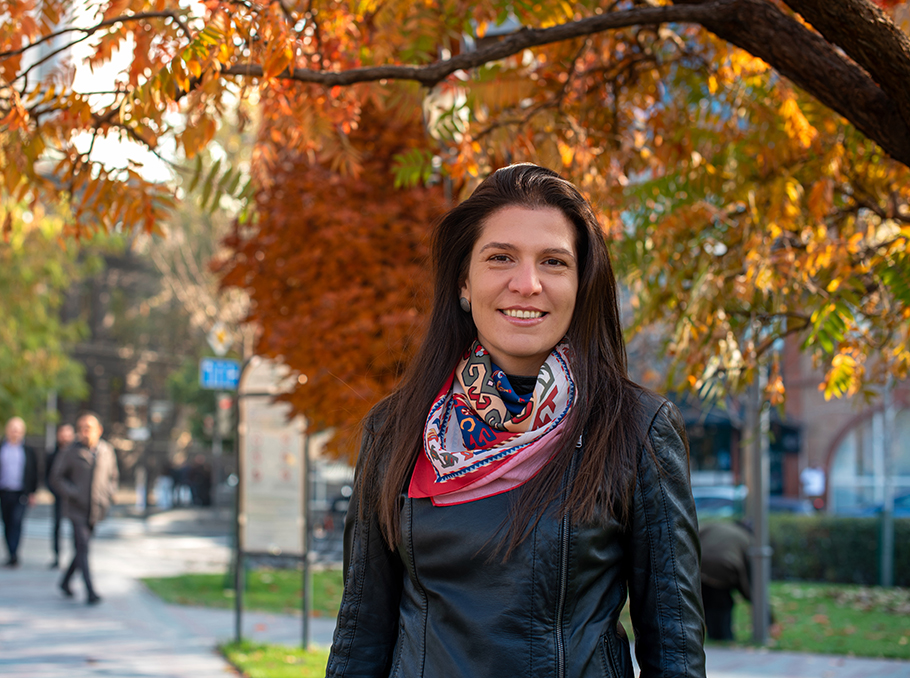
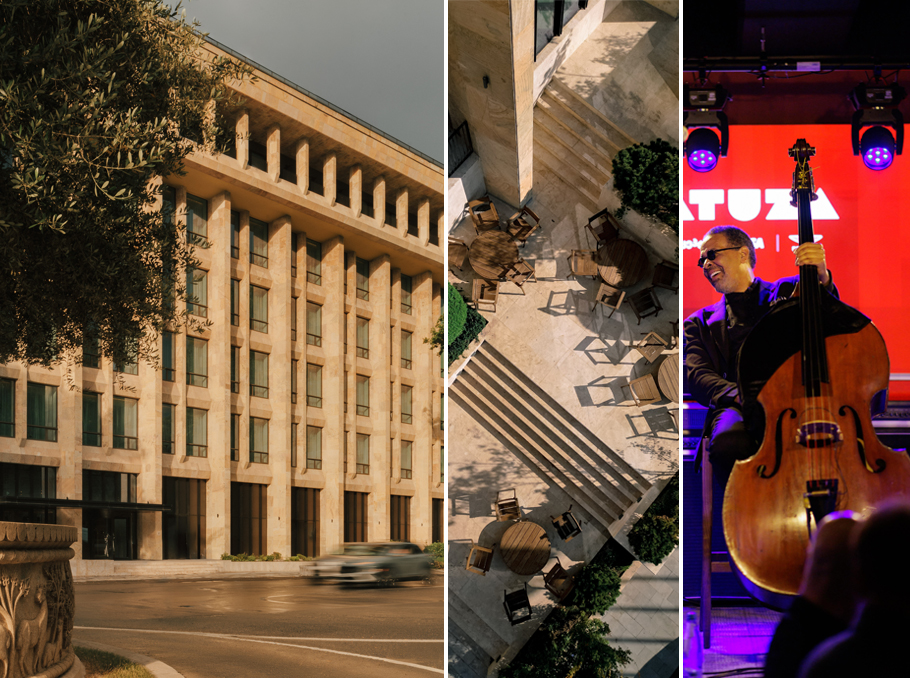
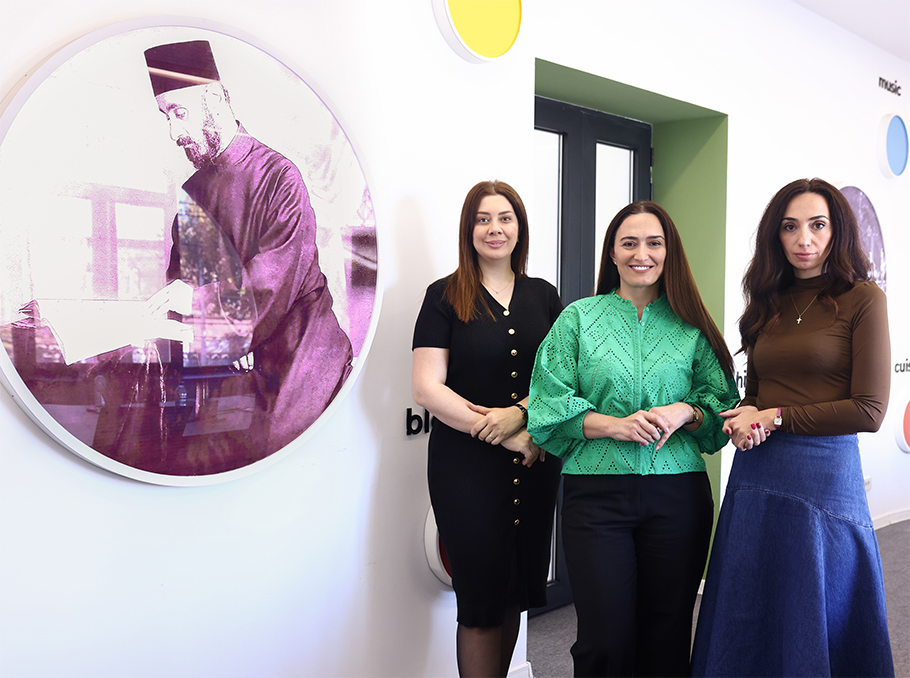
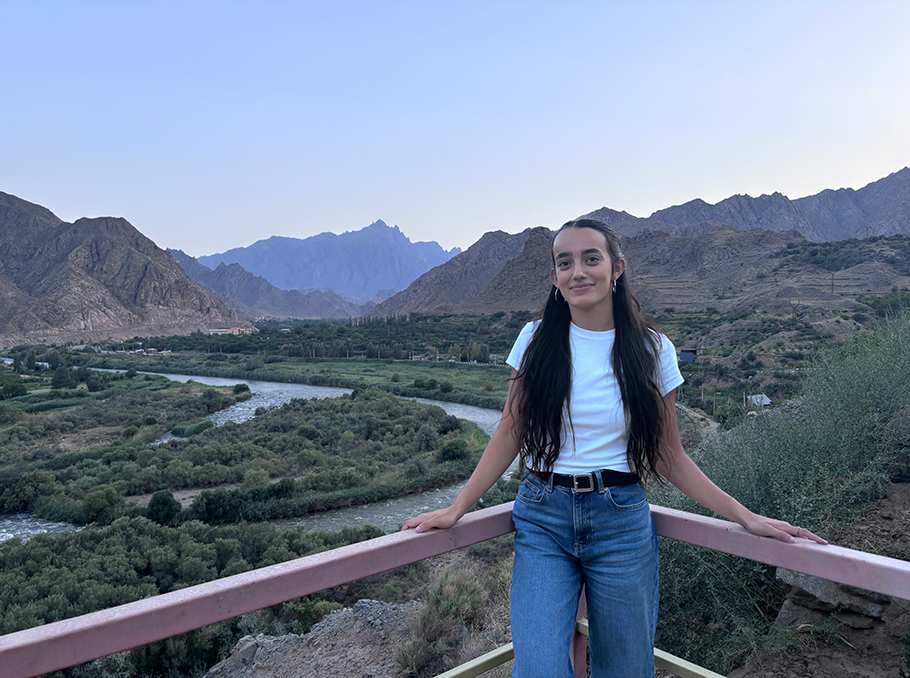







Comments
Dear visitors, You can place your opinion on the material using your Facebook account. Please, be polite and follow our simple rules: you are not allowed to make off - topic comments, place advertisements, use abusive and filthy language. The editorial staff reserves the right to moderate and delete comments in case of breach of the rules.